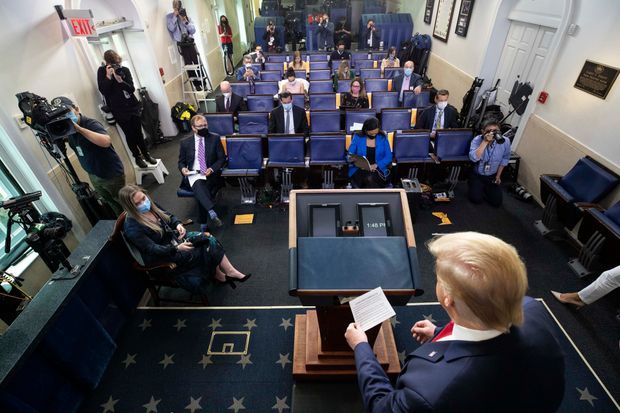
A return to balance would be commercially unviable. The best solution may be an honest embrace of bias.
President Trump arrives to speak with reporters in the White House, May 22.
About 35 years ago I was sitting at lunch next to Jeane Kirkpatrick, a onetime Democrat who became a foreign-policy adviser to President Reagan and later U.S. ambassador to the United Nations. She was lamenting what she called the “liberal leaning” media. As the president of CBS News, I assured her it was only a “liberal tilt” and could be corrected.
“You don’t understand,“ she scolded. “It’s too late.”
Kirkpatrick was prophetic. The highly influential daily newspapers in New York, Washington, Los Angeles and Boston are now decidedly liberal. On the home screen, the three broadcast network divisions still have their liberal tilt. Two of the three leading cable news sources are unrelentingly liberal in their fear and loathing of President Trump.
News organizations that claim to be neutral have long been creeping leftward, and their loathing of Mr. Trump has accelerated the pace. The news media is catching up with the liberalism of the professoriate, the entertainment industry, upscale magazines and the literary world. Recent arrivals are the late-night TV hosts who have broken the boundaries of what was considered acceptable political humor for networks.
To many journalists, objectivity, balance and fairness—once the gold standard of reporting—are not mandatory in a divided political era and in a country they believe to be severely flawed. That assumption folds neatly into their assessment of the president. To the journalists, including more than a few Republicans, he is a blatant vulgarian, an incessant prevaricator, and a dangerous leader who should be ousted next January, if not sooner. Much of journalism has become the clarion voice of the “resistance,” dedicated to ousting the president, even though he was legally elected and, according to the polls, enjoys the support of about 44% of likely 2020 voters.
This poses significant problems not only for Mr. Trump but for the media’s own standing. If Mr. Trump prevails in November, what’s the next act, if any, for journalists and the resistance? They will likely find Mr. Trump more dangerous and offensive in a second term than in the first.
More important, how will a large segment of the public ever put stock in journalism it considers hostile to the country’s best interests? Unfortunately, dominant media organizations have bonded with another large segment of the public—one that embraces its new approach. Pulling back from anti-Trump activism could prove commercially harmful.
On the other hand, how would the media respond to a Joe Biden victory (beyond exhilaration)? Will Mr. Biden be subjected to the rigor and skepticism imposed on Mr. Trump? Will he get a pass because he is a liberal and “not Trump”? The media’s protective coverage of the sexual-assault allegation against Mr. Biden is perhaps a clear and concerning preview to how his presidency would be covered.
The media seems uninterested in these issues of bias. But wouldn’t a softening of its editorial orientation bring new readers or viewers? Probably not. The growth of new customers would be more than offset by the defection of outraged members of the current audience. The news media seems very comfortable with its product and ability to sell it.
There’s probably no way to seal the gap between the media and a large segment of the public. The media likes what it is doing. Admires it. Celebrates it. There is no personal, professional or financial reason to change. If anything, the gap will expand. Ultimately, the media finds the “deplorables” deplorable.
Dan Abrams, ABC’s chief legal-affairs anchor and founder of the website Mediaite, has a novel but valuable idea for the media—candor. Speaking to the matter at February’s Rancho Mirage Writers Festival, Mr. Abrams said “I think the first thing that would help . . . is to admit . . . that the people in the media are left of center.”
It would be delightful if a publisher, an editor, a reporter, would just say: Yes, I am left of center! I’m proud of it. I think our reporting is accurate. It best serves the public. And the credibility of the media. So there!
Publications open about their bias might feel freer to focus on the specifics: story selection, presentation, facts, fairness, balance. Not devoid of subtlety for sure, but manageable.
Journalism affects social cohesion. Convinced of its role and its legitimacy, however, the media doesn’t seem to much care. And the other side can certainly enjoy throwing rotten tomatoes at distant targets.
But America won’t reunite until far more people can look at a news story in print or on the screen and, of all things, believe it.
Mr. Sauter was president of CBS News, 1982-83 and 1986.

